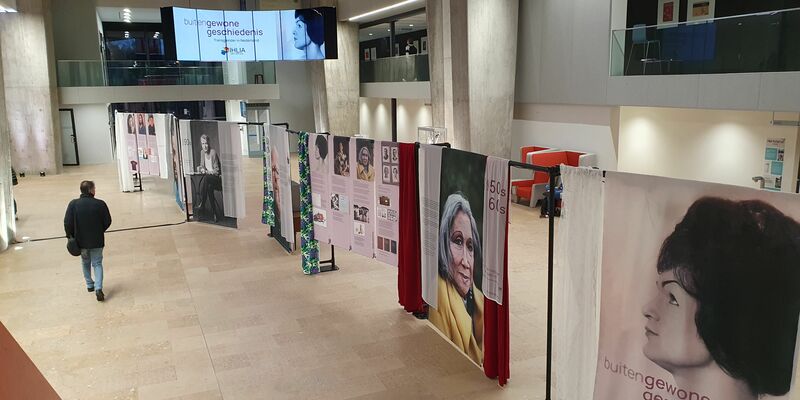
- Campus
- 16/11/2022
Compass exhibition brings trans persons’ struggles to light
People who distance themselves from the gender defined or assigned to them at birth have long kept themselves hidden – or do so to this day. In a traveling exhibition on transgender people, Compass brings to light the struggles faced by trans men and women, non-binary gender queers and cross-dressers in the Netherlands since the 1950s. As of today, brave personal stories are on display in the hall of the Atlas building.
The initiative to bring the traveling exhibition by historian Alex Bakker and the international LGBTI heritage organization IHLIA to TU/e was undertaken by Chloe van de Heuvel. Until recently, the master’s student was president of Compass, TU/e’s LGBTQ+ community. Compass is a foundation and therefore has no members. However, fellow board member Ludo van Meeuwen (General Affairs employee) can attest that there are 173 active followers in the WhatsApp group chat and 756 followers on Insta. “Those numbers are still growing.”
Compass has been around for five years now. Every year, it organizes a lecture or discussion in collaboration with Studium Generale; this lustrum will be a somewhat grander event. The massive screens and displays in the hall of Atlas present the stories of drag queens, trans men and women and non-binary people. They ended up in transvestite theaters, illegal bars or even prison. In these stories, they share their experiences of looking for role models, seeking help and wanting to be themselves.
Glass closet
In order to add an Eindhoven touch to the exhibition, Compass organized two workshops in which objects were collected that represent the emancipation struggle of people at TU/e. T-shirts, black pumps in size 11, stained glass art and other items are being exhibited in a glass showcase.
Chloe van den Heuvel placed her injection needle and bottle of estradiol hormone in there. “When I wanted to transition, there was an extremely long waiting list for medical help. That’s why I ordered this hormone from a trans woman who traded it herself – illegally. It made my skin softer, increased my breast growth, and made my emotions more feminine. It’s an artificial form of estrogen. After giving myself those first few injections, my doctor helped me along.”
Hate tirade
Transgender emancipation has progressed rapidly in recent years. The former Compass president is now 28 and – surrounded by stories of transgender people from previous decades – she is happy that she can feel accepted. “When talking to Compass friends who are younger than me, I notice that they’re already more informed than I was eight years ago.”
Van Meeuwen is also proud of the progress, but notes that there is still a long way to go. “There’s still much room for improvement when it comes to the use of language; think of how we welcome people by saying “ladies and gentlemen”, for example. That’s not inclusive of non-binary persons. We still have a lot of work to do. That’s something you can see here as well. Transgender people are still receiving a lot of hate messages on social media.”
Alex Bakker has placed a curtain in front of those hate messages. This offers people a choice; to look or not to look? Van Meeuwen: “I say look. It shows you that being allowed to be yourself is not yet a given. .....”
The exhibition ‘Transgender in the Netherlands’ is on display through December 13 in the hall of the Atlas building.
Discussion